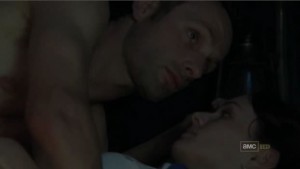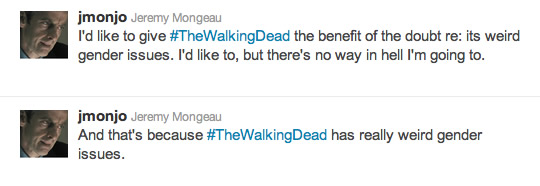The Walking Dead – “Tell It to the Frogs”
“Why don’t you take that stupid hat and go back to On Golden Pond?

“Oh, don’t worry: he won’t wake up. I made time between running from zombies and scraping by to survive to bump uglies with your best friend while your son slept in the next bed and he never made a peep. Carl, not Shane. Shane’s a screamer. Did I mention that I made you a cuckold? I did. But we can laugh about it now. Ha ha ha. Ha?”
The complaint from several people (including myself) is that last week’s episode of The Walking Dead felt too much like the horror movies the pilot promised so much against. Dialogue was atrocious, themes were too obvious, it borrowed so heavily from its genre-mates (even parodies like Shaun of the Dead) that it felt unoriginal, and the slow-build-tension, character-focused, trope-examining, AMC-promise-of-story was violated by what was, essentially, a conventional horror plot.
Perhaps I felt that way because I brought expectations to this episode. After talking it over during the Monsters of Television podcast, they might have needed a hook after that first episode in order to grab as many people as possible. Sure, the story for the first episode set a tone but we’re dealing with television afterall and it’s not called “broadcast” for nothin’. Stupid farmers.
In any event, the third episode is kind of a marriage of the two in that we have some interesting character deepening events with some heavy-handed themes, even ones that are vocalized pretty blatantly (more so than even the “us against them” speech Rick gave Mearle on the rooftop). There’s some good stuff here, some cheesy stuff, and one big huge “WHY. WOULD YOU DO THAT?” For those of you that watched the episode, I’m pretty sure you know where I’m going.
Let’s start with the good stuff. Reuniting everyone at the camp (in Marietta it looks like?) was a good moment. Everything from the confusion of the car alarm (Shane yelling about how dangerous it is, Andrea’s sister Amy demanding answers from Glenn) to the actual reunification of families, particularly the issue-laden Grimes family, was pitch-perfect. Not too sappy, no sentimental soundtrack, just people naturally enthralled (and surprised) to see each other. Obviously, the whole thing brings up a host of issues, especially with Shane and his thinly-veiled desire to be the man Rick Grimes is. And although being back with his wife reduces Rick to only being able to communicate in Baldwin, his story throughout this episode keeps with his character without becoming too archetypically heroic. Something tells me, however, that Glen is going to become my favorite character.
My favorite recurrent theme for this series is humanizing the dehumanized, whether the show intends to do this or not. The monsters and main antagonists of The Walking Dead are obviously the Walkers, beasts that used to be human. So, essentially, in order to survive, every human has to conquer the prime directive hardwired into his or her evolution: don’t kill human. They justify it by debasing the zombies as incapable of being helped, shaping them into villains, and creating an “us vs them” culture in order to substantiate was is, essentially, the easy way of eliminating the threat. Instead of finding a more intellectual solution, they resort to the decidedly more base instinct to destroy the Other. This is a given for most horror pieces as that is the first building block of any monster/zombie/alien flick: they are different, they are against us, they must be destroyed. But what intrigues me and where I think the most powerful parts of this story so far lie is in anthropomorphizing the monsters they try to steal human qualities from in the first place. In the pilot this came up as Morgan Jones struggled to pull the trigger on his be-ghouled wife. Here (and maybe this was just a test of my limits for on-screen violence) is was when the Walker was eating the deer. The men were alerted by the shrieks of women and children to eliminate the Walker, who was just feeding on a deer carcass. Four of them descend the hill and surround the ghoul, who, sensing the danger, stood up and let out that death rattle of a howl. The humans took out the beast in gruesome fashion, bludgeoning it to death before decapitation. This wouldn’t have stuck out to me if they hadn’t (a) spent so much time on how long it took for the humans to bring the zombie down or (b) took the time to focus on reactions from the women-folk at their action. I understand the danger a Walker poses that close to their camp (see my note on that later) and I don’t think that they would be able to incorporate a this little fella into their new society. I’m not suggesting they shouldn’t have killed the Walker. My point is that how they set this scene up showed a bit of innocence to the zombie because, technically, he wasn’t hurting anybody and was suddenly gang-beaten four against one. It’s an interesting exception to this “us vs them” strategy as the humans appear as the unsympathetic aggressors (a slight change in tone from the pilot though not unwarranted).
Other things that happened at the camp were not so subtle. Going into this episode, I had this tweet in mind from Jeremy Mongeau:
And it appears that The Walking Dead wanted to make that abundantly clear to you in this episode. While the men play (Shane and Carl chasing frogs) or go hunting (the team sent back to Atlanta to get Mearle), the women are stuck doing laundry on washboards (who saved those when they ran from the city?) and suffering domestic violence from their husbands. Jacqui makes sure to announce the division of labor being skewed. Lori even utters the line, “I’m a girl; talk to him” when discussing frog-catching, as if it was unfathomable to understand what the desire would be for a young boy to play in the mud and water to catch frogs without a penis.
But like any good horror movie, the premise is really just a way to work out social problems or at least present them to us in a way we can understand. The problems with the “us vs them” strategy will continue throughout the series but we’ve already run into the race social problem and now, with Ed and Carol, we exorcise the demon of domestic violence. Shane, a man suffering the loss of a family he never really had, take his aggression out on a man that isn’t properly appreciative of his own wife and kid. Just like the racist is left to rot on the roof of a building in downtown Atlanta, the abuser is beaten to a pulp and threats are made on his life. It builds your character.
Some other brief notes:
- Darryl is a decent addition to the crew. He’s clearly supposed to be just as ignorant as his brother though, apparently, not as vocal about it but his crossbow is genius (projectile weapon that is comparatively silent to its firearm cousin). I like the idea of having a trained hunter on the team, especially one with Darryl’s personality, since that element of zombies-as-animals will become more of an issue as we continue. Also, Darryl made a reference to a Katherine Hepburn movie and used it as an insult. That’s respectable.
- From the camp, one can see pieces of the Atlanta skyline (most prominently the Bank of America building) which means they aren’t that far away from Atlanta at all. In fact, it kind of resembles what the skyline looks like from the Clifton Road corridor (where the CDC is) or possibly from the Cumberland area of Marietta, a city that sits relatively close to the Perimeter (I-285, the ring road around the city of Atlanta). It begs the question: why not head to Roswell, Alpharetta, Cherokee County, Dalton, Dahlonega? The North Fulton County suburbs are within 30 minutes drive from the city, Dahlonega and Dalton probably an hour or hour and a half. I understand they might have wanted to stay close for the people venturing into the city to get survivors but you might not want to stick around so close to town if you’re afraid Walkers might get out of town. Granted, you get far enough out into the country and you have a new fear: Leatherface.
- And now the big finale: Glen, Rick, Daryl, and T-Dog get to the top of the building and cut the chain to find a saw, a hand, and the handcuffs still on the pipe. With the saw involved, I assume we’re supposed to eliminate the possibility that zombie ate him all up except for that one hand. So, if you finally get a hack saw — WHY WOULD YOU SAW THROUGH YOUR OWN HAND? You have the tool you need to saw through the metal. Why decide to lop off your own hand instead? There is no wooden puppet telling you what to do. I was already suspending my disbelief since I know younger versions of Merle that are just as anti-authority and they all know how to break their thumbs to get out of the cuffs. Maybe we can blame the delusional insanity Merle was demonstrating in the tease but it seems so drastic and weird that he’d cut his own hand off in order to get out of the cuffs. Did I just miss something?
- November 15, 2010
- Nick
- Episode Review
- The Walking Dead


